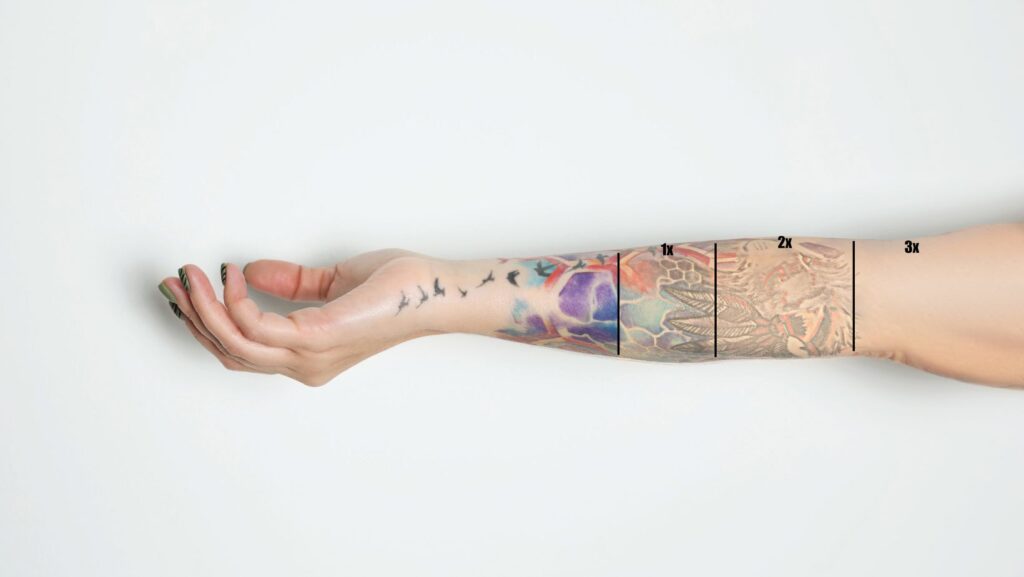In this article, we will explore the five key factors that can influence the outcome of laser tattoo removal procedures. If you’re considering or undergoing tattoo removal, understanding these factors is crucial, as they play a significant role in determining the success and effectiveness of the treatment.
Key Takeaways:
●Laser tattoo removal results can be affected by various factors.
●Skin color and tattoo pigment can impact the success of removal.
●The size and location of the tattoo play a role in the outcome.
●Skin health and immune system function can influence the results.
●By considering these factors and working with a trained specialist, better results can be achieved.
Skin Color and Tattoo Pigment
The color of your skin and the type of tattoo pigment used can significantly affect the outcome of laser tattoo removal. When it comes to laser tattoo removal and skin color, individuals with darker skin tones may require specific laser settings to minimize the risk of hyperpigmentation or hypopigmentation. The melanin in darker skin can absorb more laser energy, potentially leading to unwanted side effects or ineffective tattoo removal.
Furthermore, different tattoo pigments can behave differently under laser treatment. Some pigments, such as black and dark blue, are generally easier to remove, while others like red, yellow, and green can be more challenging. Laser wavelengths and settings need to be tailored accordingly to target specific pigments and achieve optimal results.
It is important for individuals with diverse skin tones to consult with a qualified laser tattoo removal specialist who has experience working with different skin types and pigments. This ensures that the treatment plan is carefully customized to address specific needs and minimize the risk of complications.
Tattoo Size and Location
The size and location of a tattoo can significantly impact the success of laser tattoo removal. When it comes to large tattoos, the removal process may require multiple sessions to achieve complete clearance. This is because the larger the tattoo, the more ink is present, and thus, more treatment sessions are typically needed to break down the pigment effectively.

When removing tattoos in sensitive areas, such as the face or groin, additional caution and precision are required. These areas tend to have thinner skin and are more prone to scarring and discomfort during the laser tattoo removal process. A skilled technician will take extra care to adjust the laser settings and ensure the safety and comfort of the individual undergoing the procedure.
The success rate of laser tattoo removal also depends on the location of the tattoo on the body. Some areas, like the arms or legs, tend to respond well to treatment due to good blood circulation and easier access to the laser. Conversely, tattoos located on areas with less blood flow, such as the hands or feet, may pose more challenges for complete removal.
For those seeking professional help, laser tattoo removal Brisbane offers a range of clinics with experienced specialists who can help you achieve optimal results. By considering these factors and working with a trained specialist, better results can be achieved.
By understanding these factors, you can make informed decisions and increase the chances of successful tattoo removal.
Skin Health and Immune System
The success of laser tattoo removal is not solely dependent on the laser technology or the expertise of the specialist performing the procedure. The overall health of your skin and immune system also plays a vital role in achieving successful tattoo removal.
When your skin is healthy, it has a better ability to heal and respond positively to the laser treatment. On the other hand, factors such as sun damage, smoking, and certain medical conditions can hinder the skin’s natural healing process and impact the effectiveness of tattoo removal.
Sun exposure can cause damage to the skin, including premature aging and discoloration. If you have had excessive sun exposure or tanning before undergoing laser tattoo removal, it may affect the overall outcome. Sunburned skin is also more sensitive and can be more prone to complications during and after the treatment.
Smoking is another factor that can negatively impact the success of tattoo removal. Research shows that smoking can impair the body’s ability to heal and regenerate cells, which can lead to slower recovery times and potentially affect the skin’s response to laser treatment. Therefore, it is recommended to quit smoking before and after tattoo removal to enhance the chances of successful removal.
In addition, certain medical conditions can affect the skin’s healing process and immune system function. Conditions such as diabetes, autoimmune disorders, and chronic illnesses can compromise the body’s ability to repair and respond effectively to laser treatment. It is important to discuss any underlying medical conditions with your laser tattoo removal specialist to ensure proper care and maximize the chances of a successful outcome.
Hence, to increase the likelihood of successful tattoo removal, it is crucial to maintain healthy skin and support your immune system. This can be achieved through proper skin care, protecting your skin from excessive sun exposure, avoiding smoking, and managing any medical conditions that may impact the healing process.
Next, we will explore the impact of skin color and tattoo pigment on laser tattoo removal.
Conclusion
In conclusion, the success of laser tattoo removal is influenced by several key factors. These factors include the individual’s skin color and the type of tattoo pigment used. Darker skin tones may require specific laser settings to minimize the risk of pigmentation issues, while certain tattoo pigments may be more difficult to remove than others.

Additionally, the size and location of the tattoo play a role in the effectiveness of the removal process. Large tattoos may require multiple sessions to achieve complete removal, and tattoos in sensitive areas demand extra caution during treatment.
Furthermore, it’s important to consider the overall health of the skin and the functionality of the immune system. Factors such as sun damage, smoking, and underlying health conditions can affect the skin’s ability to heal and respond to the laser treatment, potentially impacting the final results.
By taking these factors into account and partnering with an experienced laser tattoo removal specialist, individuals can maximize their chances of achieving clearer skin through this advanced cosmetic procedure. Understanding the impact of skin color, tattoo pigment, size, location, skin health, and immune system function is crucial for managing expectations and obtaining optimal outcomes.



